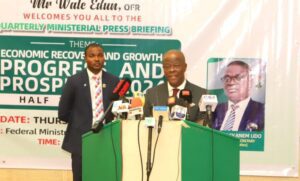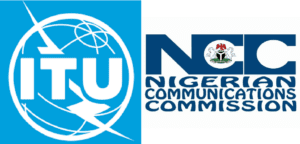
2023: FG proposes N19.76trn budget of N12.41trn deficit
…Projects N6.34trn revenue
…Targets N373.17bn oil revenue, N5.97trn from non-oil sector
…treasury funded capital projects may suffer — Finance Minister
…As crude oil production challenges, PMS subsidy deductions threaten revenue growth targets
…Reps go tough on revenue generating Agencies
By Moses Adeniyi
Nigeria’s debt would further heap up as the Federal Government is working towards a proposed budget estimate of N19.76trillion with a deficit hovering between N11.30trn and N12.41trn – Nigerian NewsDirect has learnt.
The projected deficits between N11.30trn and N12.41trn in 2023, is up from N7.35trn in 2022. The figure represents 5.01 per cent of the estimated GDP (Gross Domestic Products), above the 3 per cent threshold stipulated in the Fiscal Responsibility Act, 2007.
Borrowings to fund budget deficits have been decried largely in view of rising debt profile and the burden of debt servicing recenfly.
Nigeria’s debt profile has been projected to hit N45trn by end of 2022, as Debt-to-GDP ratio stands at 23.27 per cent.
Although stakeholders have lamented that the larger chunk of revenue now goes for debt servicing, the Federal Government has held on the argument that the Country’s Debt to GDP ratio is still within sustainable limits.
This is just as stakeholders have observed a gloomy projection for budgetary performance in 2023 owing to crude oil production challenges, particularly with struggles to meet up with the 1.8million barrel per day oil output quota approved for the Country by the Organisation of Petroleum Exporting Countries and its allies (OPEC+).
Acts of pipeline vandalism and oil theft have posed strains to oil production as the Country struggles to maintain 1.4million barrel per day output, a development which stakeholders believe, alongside Premium Motor Spirit (PMS) subsidy (popularly called petrol subsidy) deductions by the Nigerian National Petroleum Company Limited, threaten revenue growth targets and budgetary performance.
In a disclosure on Monday in Abuja, the Minister of Finance, Budget and National Planning, Zainab Ahmed, who made the proposed 2023 budget estimate known, decried that the government might be unable to provide for treasury funded capital projects next year.
According to her, the inability to provide for treasury funded capital projects next year would largely be informed by dwindling revenue shortfalls and payment of subsidies on PMS.
The Minister in her presentation to the House of Representatives’ Committee on Finance at the hearing on the proposed 2023-2025 Medium Term Expenditure Framework and Fiscal Strategy Paper, pointed out that crude oil production challenges and PMS subsidy deductions by NNPC Limited constitute a major threat to the country’s revenue growth targets.
She stated that bold, decisive and urgent action must be taken to address revenue shortfall and expenditure efficiency at the national and sub-national levels.
“In this scenario, the budget deficit is projected to be N11.30tn in 2023, up from N7.35tn in 2022. This represents 5.01 per cent of the estimated GDP (Gross Domestic Products), above the 3 per cent threshold stipulated in the Fiscal Responsibility Act, 2007,” she noted.
In her analysis of weighing the options of considerable scenarios, she said the government could opt for payment of petrol subsidy from January to December.
“Given the severely constrained fiscal space, budget deficit is projected to be N12.41tn in 2023, up from N7.35tn budgeted in 2022, representing 196 per cent of total FGN revenue or 5.50 per cent of the estimated GDP.
“This is significantly above the 3 per cent threshold stipulated in the Fiscal Responsibility Act 2007 and there will be no provision for treasury funded MDA’s capital projects,” she said.
She stated further that under the first scenario, the government’s projected revenue for 2023 is N6.34tn, out of which only N373.17bn is expected from oil related revenue, while the balance of N5.97tn will come from non-oil sources.
In the second scenario, the Minister said, “In addition to subsidy reform, this scenario assumes an aggregate implementation of cost-to-income limit of Government Owned Companies.
“With these, the 2023 FGN revenue is projected at N8.46tn out of which N.99tn or 23 per cent is projected to come from oil revenue sources.”
She noted that the business-as-usual scenario assumes that subsidy on PMS, which is estimated to be N6.7tn for a full year, will remain in 2023 and be fully provided for, while another scenario is the reform scenario which assumes that petrol subsidy will remain up to mid 2023 based on the 18 month extension announced early 2021, in which case, only N3.6tn will be provided for.
On the key assumptions of the proposed 2023 budget, the Minister said oil benchmark is estimated at $70 per barrel, with an oil production benchmark of 1.69 million barrel per day and an exchange rate of N435.02 to a dollar.
According to the Minister, inflation is expected to grow at 17.16 per cent, while the GDP is expected to grow at 3.75 per cent.
She said an upward pressure on prices is expected to be driven by the current and lag effect of the global price surge due to the Russia-Ukraine war, domestic insecurity, rising costs of imports, exchange rate depreciation as well as other supply side constraints.
In response, the Chairman of the House Committee on Finance, James Faleke, pointed out that in the prevailing financial situation in the country, all revenue sources explored by the government were constrained.
Faleke who said it was clear fact that when there is no revenue, every aspect of the country suffers, tasked all agencies appearing before the committee to provide the committee with accurate position of their revenue state.
According to him, the Committee would give no room to any agency to play with the revenue of the Country at this critical time.
Accroding to the Debt Management Office (DMO) Nigeria’s total public debt stock increased to N41.60trn in the first quarter of 2022.
“The total public debt stock as at March 31, 2022, was N41.60tn or $100.07bn, according to the Debt Management Office.
“The amount represents the domestic and external debt stocks of the Federal Government of Nigeria, the thirty-six state governments and the Federal Capital Territory. The comparative figures for December 31, 2021, were N39.56tn or $95.78bn,” the DMO had stated its report.
According to the DMO, the total public debt stock includes new domestic borrowing by the FGN to partly finance the deficit in the 2022 Appropriation Act, the $1.25bn Eurobond issued in March 2022 and disbursements by multilateral and bilateral lenders.
In March 2022, a DMO document signed by the Director-General, DMO, Patience Oniha, mentioned that Nigeria’s total debt stock is likely to reach N45trn as the DMO plans to borrow an additional N6.39tn to finance the 2022 budget deficit.
In the document, the Director-General, DMO, Patience Oniha, explained that the overall deficit in the 2022 budget was N6.30tn, representing 3.46 per cent of the country’s GDP.
Oniha had said that the budget deficit was to be financed mainly by borrowings from both domestic and foreign sources, as well as privatisation proceeds.
The Lagos Chamber of Commerce and Industry (LCCI) had lamenting the situation of debt profile and servicing burden, said Nigeria is struggling to service these debts due to revenue mobilisation challenges and an increased fuel subsidy burden.
The trend, according to the LCCI, was disturbing, given that debt servicing alone was higher than actual retained revenue in the first four months of 2022.
“There are already concerns that most, if not all, of the assumptions in the Medium-Term Expenditure Framework (MTEF) 2023-2025 will be missed as we continue to experience unprecedented levels of disruptions to supply chains and agricultural production.
“The 2022 budget assumptions have already fallen short in terms of inflation, exchange rate, and GDP growth rate and all of these assumptions have become inadequate.
“Nigeria’s Debt-to-GDP ratio now stands at 23.27 per cent, as against 22.43 per cent on Dec. 31, 2021.
“On the path of caution, we urge the Federal Government to discontinue this unsustainable pattern,” the President, LCCI, Michael Olawale-Cole, had said.



